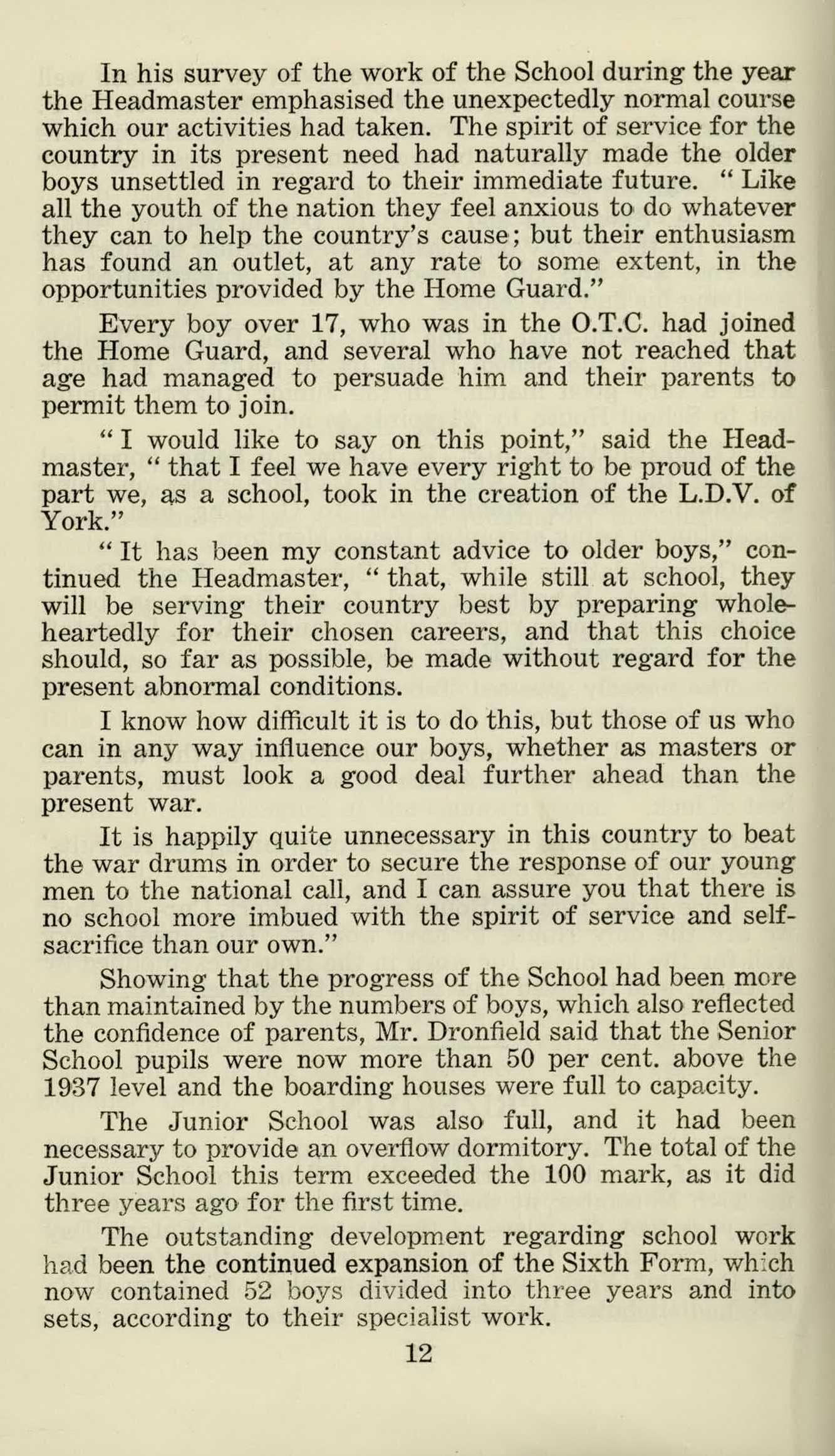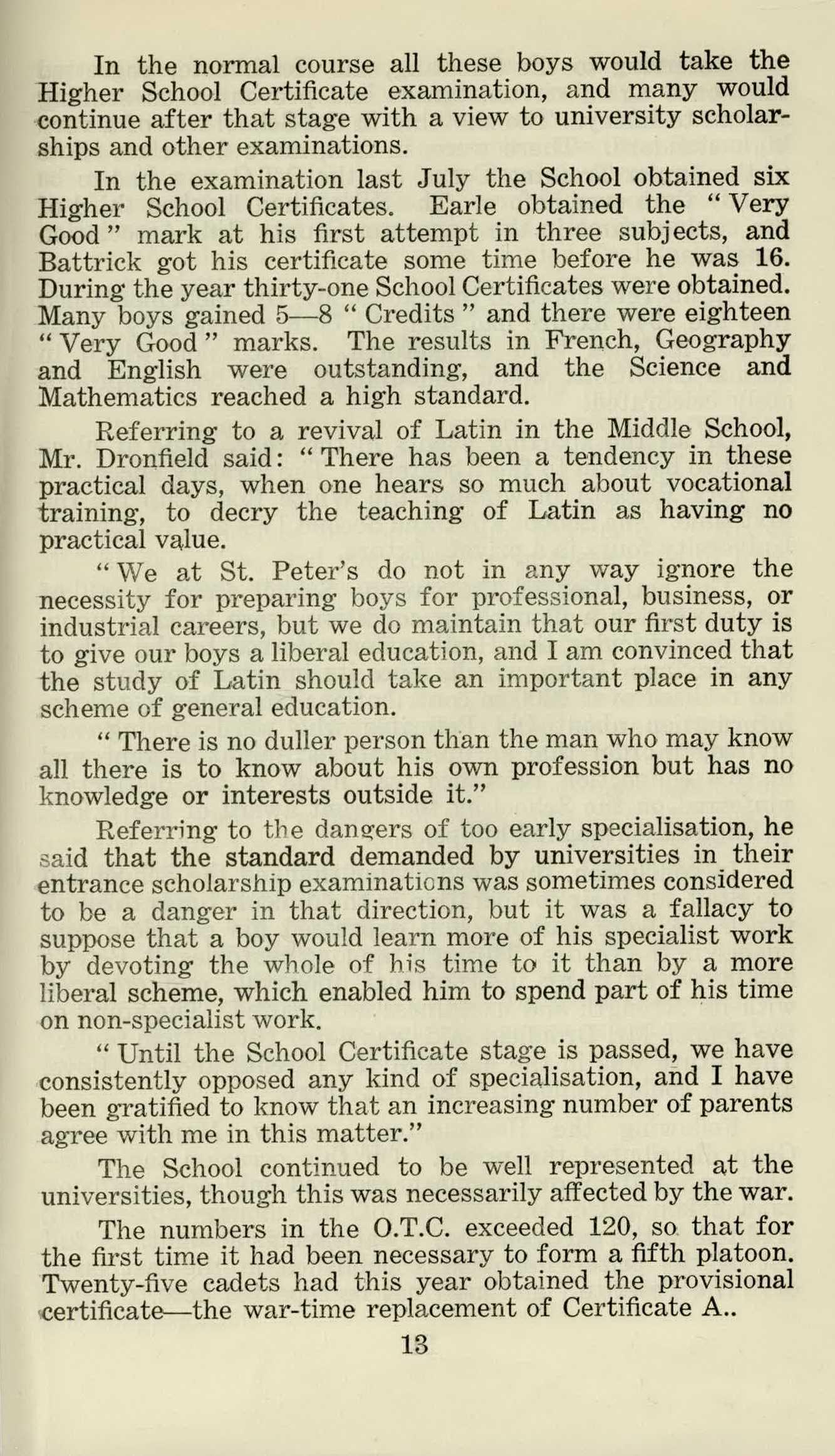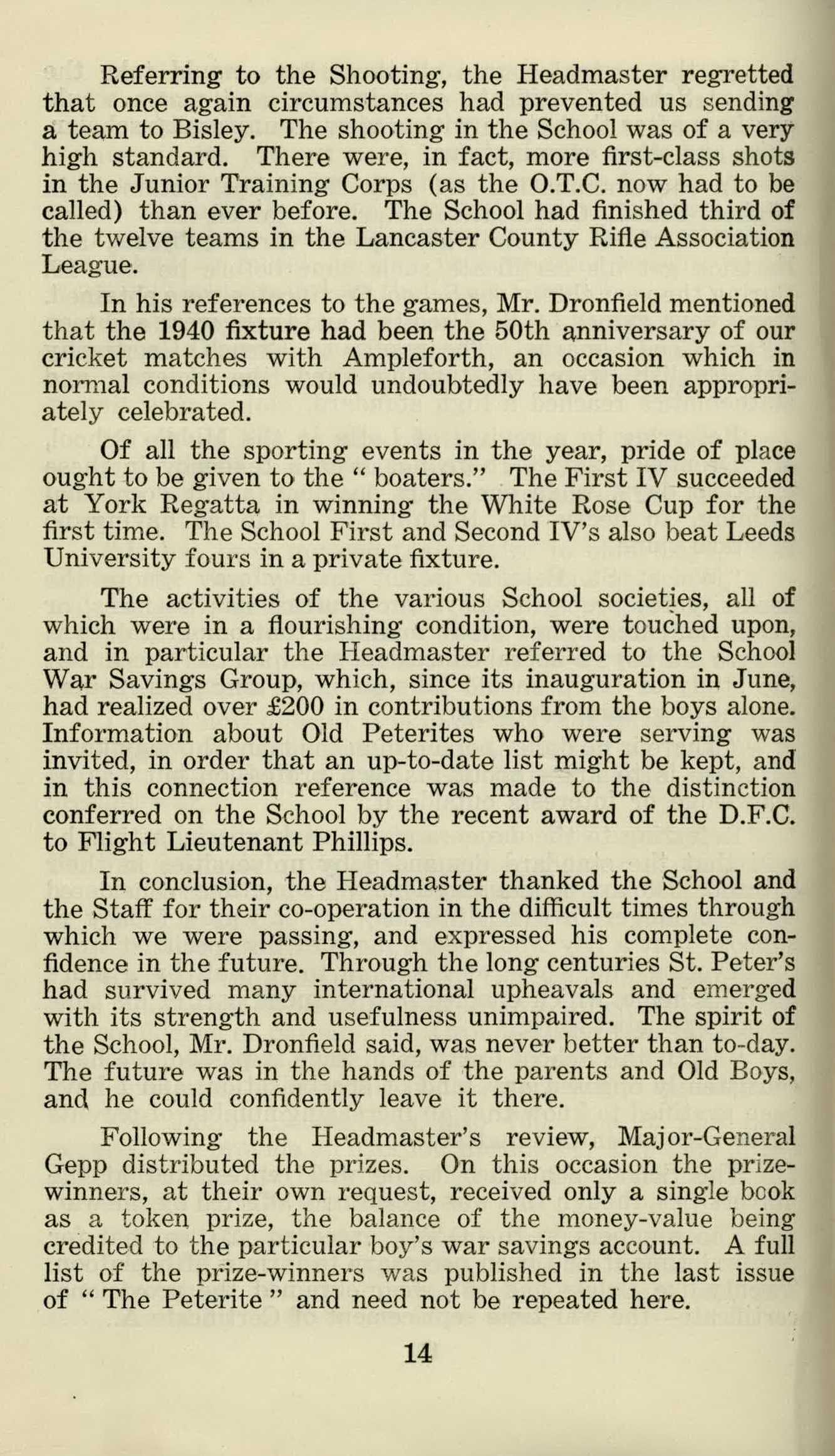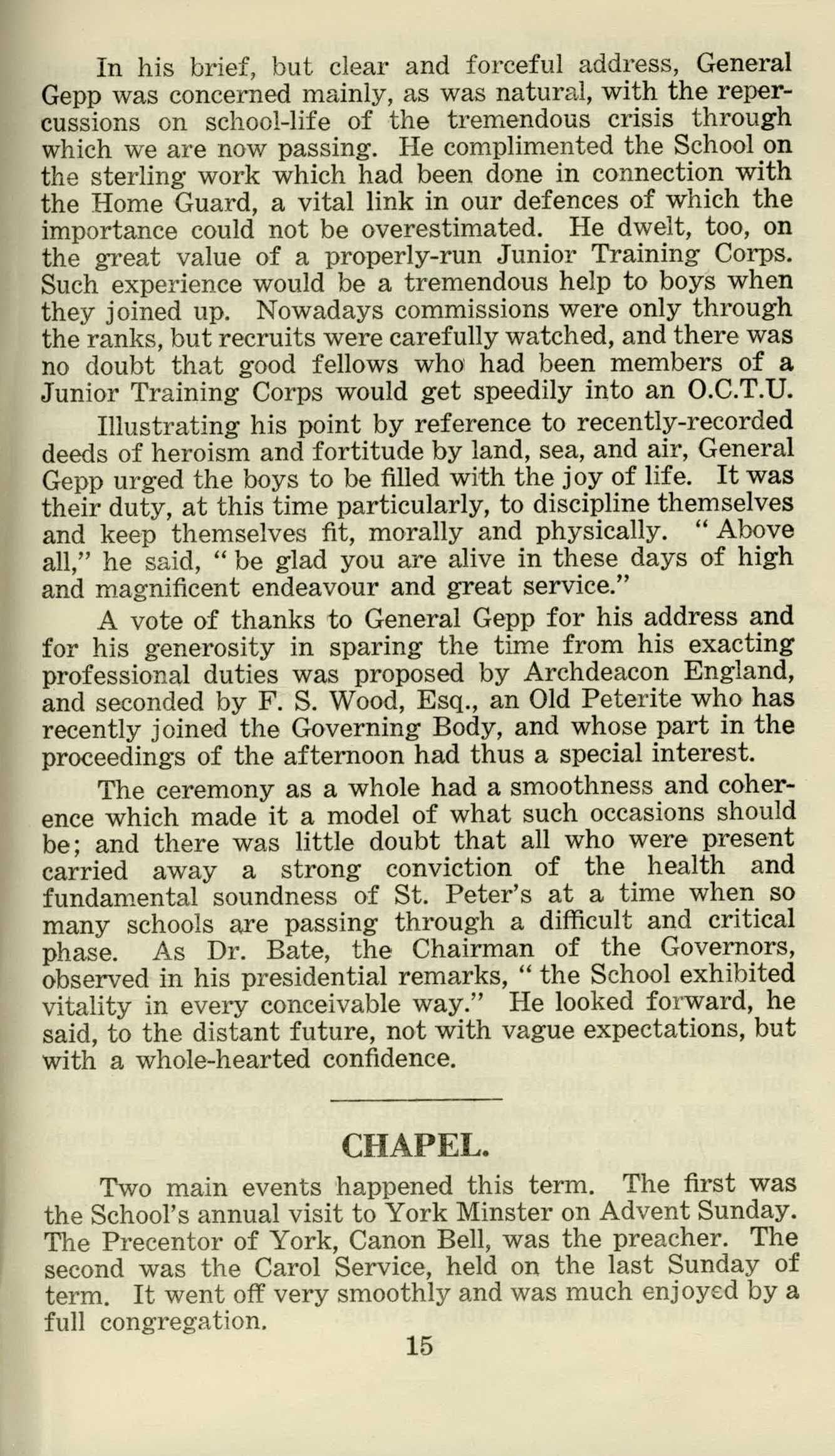
8 minute read
Prizegiving
from Jan 1941
by StPetersYork
In his survey of the work of the School during the year the Headmaster emphasised the unexpectedly normal course which our activities had taken. The spirit of service for the country in its present need had naturally made the older boys unsettled in regard to their immediate future. " Like all the youth of the nation they feel anxious to do whatever they can to help the country's cause; but their enthusiasm has found an outlet, at any rate to some extent, in the opportunities provided by the Home Guard."
Every boy over 17, who was in the O.T.C. had joined the Home Guard, and several who have not reached that age had managed to persuade him and their parents to permit them to join. " I would like to say on this point," said the Headmaster, " that I feel we have every right to be proud of the part we, as a school, took in the creation of the L.D.V. of York." " It has been my constant advice to older boys," continued the Headmaster, " that, while still at school, they will be serving their country best by preparing wholeheartedly for their chosen careers, and that this choice should, so far as possible, be made without regard for the present abnormal conditions.
I know how difficult it is to do this, but those of us who can in any way influence our boys, whether as masters or parents, must look a good deal further ahead than the present war.
It is happily quite unnecessary in this country to beat the war drums in order to secure the response of our young men to the national call, and I can assure you that there is no school more imbued with the spirit of service and selfsacrifice than our own."
Showing that the progress of the School had been more than maintained by the numbers of boys, which also reflected the confidence of parents, Mr. Dronfield said that the Senior School pupils were now more than 50 per cent. above the 1937 level and the boarding houses were full to capacity.
The Junior School was also full, and it had been necessary to provide an overflow dormitory. The total of the Junior School this term exceeded the 100 mark, as it did three years ago for the first time.
The outstanding development regarding school work had been the continued expansion of the Sixth Form, which now contained 52 boys divided into three years and into sets, according to their specialist work. 12
In the normal course all these boys would take the Higher School Certificate examination, and many would continue after that stage with a view to university scholarships and other examinations.
In the examination last July the School obtained six Higher School Certificates. Earle obtained the " Very Good " mark at his first attempt in three subjects, and Battrick got his certificate some time before he was 16. During the year thirty-one School Certificates were obtained. Many boys gained 5-8 " Credits " and there were eighteen " Very Good " marks. The results in French, Geography and English were outstanding, and the Science and Mathematics reached a high standard.
Referring to a revival of Latin in the Middle School, Mr. Dronfield said : " There has been a tendency in these practical days, when one hears so much about vocational training, to decry the teaching of Latin as having no practical value. " We at St. Peter's do not in any way ignore the necessity for preparing boys for professional, business, or industrial careers, but we do maintain that our first duty is to give our boys a liberal education, and I am convinced that the study of Latin should take an important place in any scheme of general education. " There is no duller person than the man who may know all there is to know about his own profession but has no knowledge or interests outside it."
Referring to the dangers of too early specialisation, he said that the standard demanded by universities in their entrance scholarship examinations was sometimes considered to be a danger in that direction, but it was a fallacy to suppose that a boy would learn more of his specialist work by devoting the whole of his time to it than by a more liberal scheme, which enabled him to spend part of his time on non-specialist work. " Until the School Certificate stage is passed, we have consistently opposed any kind of specialisation, and I have been gratified to know that an increasing number of parents agree with me in this matter."
The School continued to be well represented at the universities, though this was necessarily affected by the war.
The numbers in the O.T.C. exceeded 120, so that for the first time it had been necessary to form a fifth platoon. Twenty-five cadets had this year obtained the provisional certificate—the war-time replacement of Certificate A.. 13

Referring to the Shooting, the Headmaster regretted that once again circumstances had prevented us sending a team to Bisley. The shooting in the School was of a very high standard. There were, in fact, more first-class shots in the Junior Training Corps (as the O.T.C. now had to be called) than ever before. The School had finished third of the twelve teams in the Lancaster County Rifle Association League.
In his references to the games, Mr. Dronfield mentioned that the 1940 fixture had been the 50th anniversary of our cricket matches with Ampleforth, an occasion which in normal conditions would undoubtedly have been appropriately celebrated.
Of all the sporting events in the year, pride of place ought to be given to the " boaters." The First IV succeeded at York Regatta in winning the White Rose Cup for the first time. The School First and Second IV's also beat Leeds University fours in a private fixture.
The activities of the various School societies, all of which were in a flourishing condition, were touched upon, and in particular the Headmaster referred to the School War Savings Group, which, since its inauguration in June, had realized over £200 in contributions from the boys alone. Information about Old Peterites who were serving was invited, in order that an up-to-date list might be kept, and in this connection reference was made to the distinction conferred on the School by the recent award of the D.F.C. to Flight Lieutenant Phillips.
In conclusion, the Headmaster thanked the School and the Staff for their co-operation in the difficult times through which we were passing, and expressed his complete confidence in the future. Through the long centuries St. Peter's had survived many international upheavals and emerged with its strength and usefulness unimpaired. The spirit of the School, Mr. Dronfield said, was never better than to-day. The future was in the hands of the parents and Old Boys, and he could confidently leave it there.
Following the Headmaster's review, Major-General Gepp distributed the prizes. On this occasion the prizewinners, at their own request, received only a single book as a token prize, the balance of the money-value being credited to the particular boy's war savings account. A full list of the prize-winners was published in the last issue of " The Peterite " and need not be repeated here.

In his brief, but clear and forceful address, General
Gepp was concerned mainly, as was natural, with the reper- i- cussions on school-life of the tremendous crisis through which we are now passing. He complimented the School on the sterling work which had been done in connection with the Home Guard, a vital link in our defences of which the importance could not be overestimated. He dwelt, too, on the great value of a properly-run Junior Training Corps.
Such experience would be a tremendous help to boys when they joined up. Nowadays commissions were only through the ranks, but recruits were carefully watched, and there was no doubt that good fellows who had been members of a
Junior Training Corps would get speedily into an O.C.T.U. Illustrating his point by reference to recently-recorded deeds of heroism and fortitude by land, sea, and air, General
Gepp urged the boys to be filled with the joy of life. It was their duty, at this time particularly, to discipline themselves and keep themselves fit, morally and physically. " Above all," he said, " be glad you are alive in these days of high and magnificent endeavour and great service." A vote of thanks to General Gepp for his address and for his generosity in sparing the time from his exacting professional duties was proposed by Archdeacon England, and seconded by F. S. Wood, Esq., an Old Peterite who has recently joined the Governing Body, and whose part in the proceedings of the afternoon had thus a special interest. The ceremony as a whole had a smoothness and coherence which made it a model of what such occasions should be; and there was little doubt that all who were present carried away a strong conviction of the health and fundamental soundness of St. Peter's at a time when so many schools are passing through a difficult and critical phase. As Dr. Bate, the Chairman of the Governors, observed in his presidential remarks, " the School exhibited vitality in every conceivable way." He looked forward, he said, to the distant future, not with vague expectations, but with a whole-hearted confidence.

CHAPEL.
Two main events happened this term. The first was the School's annual visit to York Minster on Advent Sunday. The Precentor of York, Canon Bell, was the preacher. The second was the Carol Service, held on the last Sunday of term. It went off very smoothly and was much enjoyed by a full congregation. 15










